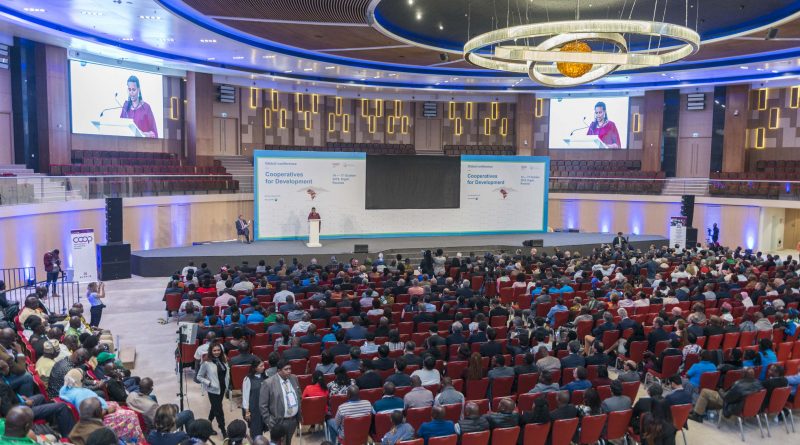CICOPA at the ICA GLOBAL CONFERENCE in Kigali
From 14 to 17 October in Kigali, Rwanda, more than 1,000 people from 95 countries participated in the 2019 edition of the International Cooperative Alliance’s (ICA) Global Conference ‘Cooperatives for Development’. The event has been organised in partnership with the Government of the Republic of Rwanda, a country where 43% of the population are members of cooperatives.
On Monday morning, CICOPA took part in the institutional opening that kicked off the three days dedicated to the theme of Cooperatives for Development. The first day of the ICA International Conference in Kigali was dedicated to the activities of #coops4dev – the ICA-EU Partnership which targets to strengthen the cooperative movement as a development actor. In the first plenary session, delegates heard how cooperatives have a dynamic role to play in sustainable development.
During the first Plenary, the very interesting keynote speech by Dr Vandana Shiva had place. Dr Shiva is a physicist by training, as well as an anti-globalisation author, food sovereignty advocate and environmental activist. She believes the role of coops – and also of apex and sector bodies – is greater than just creating more cooperatives and more employment. “Cooperation plays a true role in what development is,” she said in her keynote address at the conference. “I feel the cooperative movement could play a role in changing the rules of trade to ensure sustainability, justice and food for all. Unless you protect the last tree and the last child, you don’t have development.”
The afternoon continued with the Parallel Sessions.
The first Parallel session was on the topic of Tackling inequalities through the cooperative movement (SDG10). This parallel session focused on how the cooperative model can tackle inequalities, and measure or assess the impact of its efforts. The session included concrete examples of action, combining high-level speakers with insights from the field. Here, Graciela Fernandez from ICA America recognized how “Social Cooperatives are providing the possibility of inclusion for an important population sector giving decent work to families for reducing inequalities“
The second Parallel session: Women’s empowerment at the forefront of sustainable development (SDG5). The second session focused on how the cooperative model can better support women’s economic and political participation, with the objective of raising awareness among both male and female participants, including leaders and decision-makers in cooperatives. Maria Eugenia Pérez Zea, from Colombia’s Coomeva, President of the ICA gender committee and President of ASCOOP believed that: “Equality is giving everyone what she or he needs to reach their potential”.
Then, the third Parallel session: Co-operative entrepreneurship and lessons of innovation (SDG8). During a session on decent work and equal opportunities, delegates learnt about innovative cooperative projects, from a cooperative school in Indonesia to a Sacco (savings cooperative) in Kenya using automatized payments to farmers. The fourth Parallel session was about: Globalisation of inclusive ethical value chains (SDG12) cooperation among cooperatives was didcussed and the relationship between cooperatives and enterprises and how they can create more inclusive, transparent supply chains.
At the end of the afternoon the COOP CINEMA: A COOPERATIVE JOURNEY AROUND THE WORLD was screened. A project by Sara Vicari and Andrea Mancori who decided to travel around the world for a year to document the stories of the most interesting cooperatives in the world. Among the stories screened, the one from the Cheese Board Workers’ Cooperative in Berkley (USA) was very interesting. You can find the video here and follow their channel for other cooperative short stories.
In the morning Plenaries the topic was how cooperatives contribute to decent work and have an important role to play throughout value chains, not just at the production point as it is widely assumed. You can read an interesting and comprehensive article, written by Coopnews on the same topic here.
Iñigo Albizuri Landazabal, from Mondragon Corporation (Spain), and recently elected President of CICOPA,, spoke during this plenary session, and he underlined: “Without cooperators, there are no cooperatives. Legislation and funding are important but we tend to forget the cooperators themselves. The education of cooperative values within the value chain is very important.”
Reema Nanavati from our Indian member organisation, SEWA Federation, has claimed that “Productive and decent work is the thread that weaves society together”.
During the same plenary, Anne Laure Degris from the cooperative Smart (Belgium), pointed out that: “Smart has created an innovative model based on solidarity answering to the work “grey zone” challenges, while at the same time pursuing social transformation through a shared enterprise.“
Kangtae Park, president of Korea Federation of Worker Cooperatives presented how a Korean worker cooperative, Happybridge is trying to create a cooperative-value-based value chain around their activities.
The afternoon was time for parallel Sessions organised by the ICA Sectoral Organisations and dedicated to particular SDGs. The Parallel Session 5 had as its topic: Contributing to food security and sustainable production and consumption (SDG 12) and Parallel session 7 was: A co-op approach to housing and energy.
CICOPA, in collaboration with IHCO, organized the Parallel Session 6: How health, industrial and service cooperatives contribute to reducing inequalities. You can read a more detailed report from the session here.
During the evening Gala dinner, Rochdale Awards went to Howard Brodsky of CCA Global Partners and Kim Byeong-won, chair of the National Agricultural Cooperative Federation of the Republic of Korea.
On the last day of conferences, the morning begins with the plenary session on how cooperatives contribute to peace and equality. Cooperatives are particularly prominent in peacebuilding and post-conflict transition, fostering community development and they can help to address some of the factors that lead to conflict, such as extreme poverty.
Finally, here you can find the conference conclusions presented by Develtere and Reema Nanavati and a comprehensive article on the topic written by Coopsnews.

